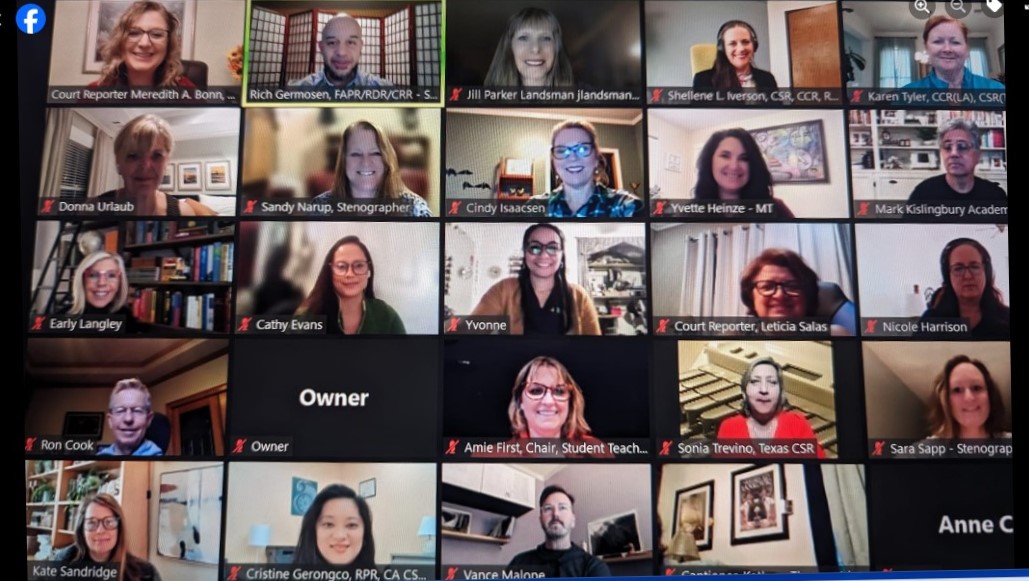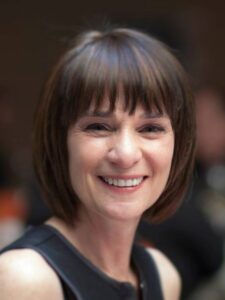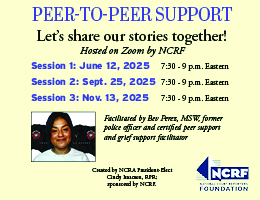By Jill Parker Landsman
Benjamin Franklin knew what it takes to be a great court reporter.
“By failing to prepare, you are preparing to fail,” Franklin said.
The panelists on the National Court Reporters Foundation Ask Me Anything: Focus on Practice agreed with Franklin. Many panelists are self-proclaimed “speed contest junkies,” and they shared their secrets for success.
The ZoomUp took place last month and attracted 45 registrants. NCRF Chair-Elect and NCRF Ask Me anything Co-Chair Meredith Bonn, RPR, CRR, served as moderator.
Explaining the discipline behind continual practice, panelist Rich Germosen, FAPR, RDR, CRR, said, “I always go to the sports analogy. If you look at your football team or baseball team, they practice. Working is the game. When I get up and I put in my 30 minutes, that is the practice; later is the show.”
Frustrated with her performance in the NCRA speed competitions, Donna Urlaub, RMR, CRR, grew tired of placing 3rd, 5th, and 6th. “If you look at the Olympics, that [performance] is a long five minutes,” she said.
“Do you have any idea how long they practiced that five minutes? Mark Kislingbury, FAPR, RDR, CRR, gave me so much incentive. I finally took his advice. Once I started practicing every single day, I finally came in first [in the competitions]. I needed that kick in the butt. The value is immense,” she said.
Kislingbury, a Guinness World Record holder for his steno speed, explained how disciplined professionals get there. “Performers of all kinds practice,” he said. “Musicians, athletes. The famous pianist Vladimir Horowitz said, ‘If I miss one day of practice, I notice. If I miss two days, my wife notices. If I miss three days, the world notices.’”
Practicing can be interesting, explained Karen Tyler, RDR, CRR, CRC. “I practice a lot of materials within our [practice] group — old speed contests, realtime contests,” she said. “I will write shows on HGTV. I do a lot of Mark’s [Kislingbury] Magnum Club. It helps me write shorter. You just find materials that interest you so you want to practice.”
Yvette Heinze, RPR, explained how she stays motivated. “The more you practice, the more addictive it becomes,” she said. “It depends on what you have time for, but at least 15 minutes [daily] even if it is just finger drills. I am not a strong writer. It is okay. We don’t all need to be Mark. You are practicing and competing with yourself. I adopted a lot of Mark’s phrases. Each week and every month, I have specific things I focus on.”
Ron Cook, FAPR, RDR, CRR, CRC, shared that he has always competed. “I majored in PE [physical education],” which he said accounts for his competitive DNA. “Frankly, the better you are, the faster you are, the easier your job is,” he explained. “If you are writing 225 [wpm], that is great, but if you could build that speed to 240, your life will be much easier. If you can get to 250, same thing. Every ounce of speed that you have is going to make your life that much easier going forward.”
Kislingbury observed that the students enrolled in his school who get the farthest are the dedicated ones. “I do see all kinds of students. There are the whizzes and there are the ones who take five to six years. ‘Life happens’ is exactly the thing that we hear. The graduates all have one thing in common. They finally got serious. They say at some point, ‘I really want this, and I am not going to give up.’ That is when they move forward and graduate.”
To learn all the practice tips from these pros, watch the full AMA Focus on Practice session.
Jill Parker Landsman is the National Court Reporter Foundation Manager. She can be reached at jlandsman@ncra.org.










